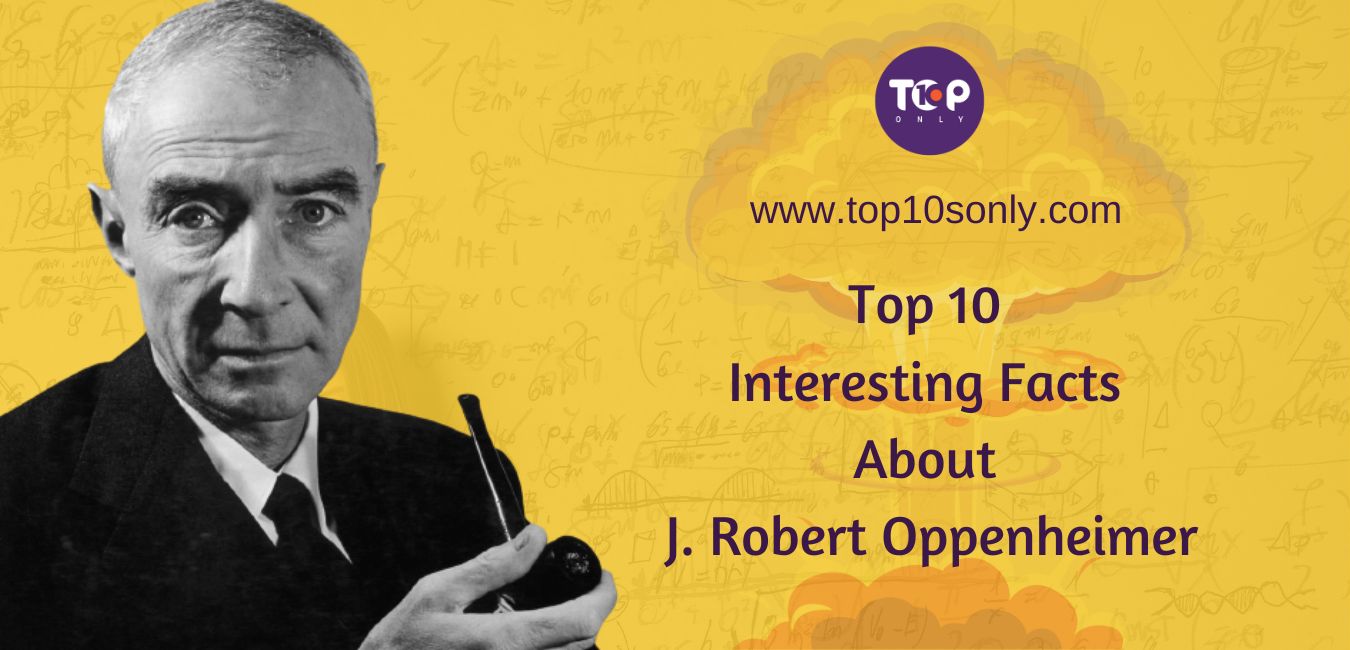Julius Robert Oppenheimer, a name etched in the annals of scientific history, is celebrated as the visionary physicist behind the creation of the first atomic bomb. Yet, beyond his groundbreaking contributions to nuclear physics, lies a man of multifaceted brilliance and enigmatic charm. Oppenheimer’s journey from a young geology prodigy to a leader of the top-secret Manhattan Project unravelled intriguing aspects of his life. With an unwavering passion for poetry, a philosophical connection to ancient texts, and a fearless stance against the hydrogen bomb, Oppenheimer’s story is a captivating tapestry of intellect, art, and moral dilemmas that continue to intrigue and inspire.
Geology Prodigy To Atomic Visionary: Unravelling The Top 10 Interesting Facts About J. Robert Oppenheimer
Here are some interesting Oppenheimer facts to know before watching the movie about this great scientist. These tidbits of information offer a unique look at the various aspects of one of the world’s greatest scientists.
1. Oppenheimer – The Geology Prodigy
Want to know a really crazy fact about Oppenheimer? Julius Robert Oppenheimer’s early fascination with rocks and minerals paved the way for his journey into the world of science. At the young age of 12, he astonished geologists with his knowledge, leading to an invitation to deliver a lecture on geology. Oppenheimer’s passion for rocks persisted throughout his life, even as he majored in chemistry at Harvard and later became a renowned physicist. With his collection and meticulous study of rock samples in Manhattan and the Hudson River Palisades as a boy, he laid the foundation for a career that would ultimately revolutionise the world of nuclear physics. Oppenheimer’s fascination with the study of rocks is definitely one of the most interesting facts about the scientist.
2. Oppenheimer – The Cosmic Rays Enthusiast
Of the 10 fascinating facts about J. Robert Oppenheimer, the one that really intrigues people is his insatiable scientific curiosity. In the realm of scientific exploration, Oppenheimer wasn’t just confined to one discipline. He embarked on the study of cosmic rays, an enigmatic form of radiation. In 1931, along with his student Frank Carlson, he authored the first of numerous scientific papers on cosmic rays. These mysterious subatomic particles, discovered just two decades earlier in 1912, intrigued Oppenheimer and his early work in this area laid the groundwork for further advancements in the field of particle physics.
3. Oppenheimer – A Helping Hand
One of the important facts about Robert Oppenheimer revolves around his origins. Oppenheimer’s family had German Jewish roots, and as the dark clouds of Nazi Germany loomed, he took decisive action to help his relatives escape persecution. In 1937, he used his personal funds to sponsor his Aunt Hedwig, her son Alfred, and their family as they sought refuge in the United States. Aside from rescuing family members, he used 3% of his salary to aid Jewish scientists in escaping Nazi Germany while teaching at Berkeley. Oppenheimer’s humanitarian gesture not only saved his family members and others from the clutches of Hitler’s regime but also showcased his commitment to standing up against tyranny and oppression.
4. Oppenheimer – Leader Of The Manhattan Project
For decades the question of who is Oppenheimer and what he did do has been the subject of several discussions. He was a theoretical physicist whose groundbreaking research led to the formation of one of the most exclusive research groups the world has ever seen! The pinnacle of Oppenheimer’s career came during World War II when he assumed leadership of the Los Alamos National Laboratory in New Mexico. Appointed by Lieutenant General Leslie R. Groves, he directed the top-secret “Manhattan Project”, a groundbreaking campaign to develop the first atomic weapons. Despite initial doubts about his suitability for the role due to his eccentricities, alleged left-wing political links and lack of administrative experience, Oppenheimer excelled in managing the laboratory and coordinating the efforts of scientists and military personnel. His expertise, and subsequent success, earned him the moniker “Father of the Atomic Bomb.”
5. Oppenheimer – A Poet At Heart
This is by far one of the most unknown facts about Oppenheimer! Behind Oppenheimer’s scientific brilliance lay a hidden passion for poetry and creative writing. Though he kept his poetic pursuits private, his affinity for verse was evident. His poem “Crossing,” a poignant meditation on nature and life, was published in the Harvard literary magazine, Hound & Horn. This artistic side offered a glimpse into the deeper layers of Oppenheimer’s complex personality, juxtaposing the rigours of science with the sensitivity of a poet.
CROSSING
J. Robert Oppenheimer
It was evening when we came to the river
With a low moon over the desert that we had lost in the mountains,
Forgotten, what with the cold and the sweating and the ranges barring the sky.
And when we found it again, in the dry hills down by the river, half withered,
We had the hot winds against us.
There were two palms by the landing; the yuccas were flowering;
There was a light on the far shore, and tamarisks.
We waited a long time, in silence.
Then we heard the oars creaking
And afterwards, I remember, the boatman called to us.
We did not look back at the mountains.
6. Oppenheimer – The Bhagavad Gita Connection
Most of Oppenheimer’s famous quotes at from critical junctures in his life. On July 16, 1945, Oppenheimer watched in awe as the first nuclear bomb, the Trinity Nuclear Test, detonated after extensive research conducted at the Los Alamos National Laboratory. In this moment of unprecedented scientific achievement, Oppenheimer’s mind turned to the Bhagavad Gita, a sacred Hindu text. He famously quoted a verse from the Gita to describe the profound impact of the event, where the prince Arjuna witnesses the awe-inspiring form of the god Vishnu. Oppenheimer’s reflection on this historical occasion revealed the moral dilemmas and responsibilities faced by scientists who unleash such immense power.
7. Oppenheimer – The Opponent Of The Hydrogen Bomb
In the aftermath of World War II, the escalating arms race between the United States and the Soviet Union brought the development of the hydrogen bomb to the forefront. However, Oppenheimer firmly opposed the creation of this even more destructive weapon. As part of the General Advisory Committee to the U.S. Atomic Energy Commission, he led discussions on the ethical and strategic implications of the H-bomb. He argued against its development, stating that the existing atomic bombs provided sufficient deterrence and that the hydrogen bomb’s destructive potential was unnecessary and inhumane.
8. Oppenheimer – The Security Risk Controversy
Over the years, one of the most asked questions was, “Is Oppenheimer a communist?” The 1950s brought a cloud of suspicion over Oppenheimer’s loyalty to the United States. His associations with individuals suspected of communist sympathies, coupled with his opposition to the hydrogen bomb, led to him being labelled a security risk. This accusation came to a head when his security clearance was revoked in 1953. Despite facing tremendous pressure to resign, Oppenheimer chose a hearing to defend himself. The proceedings, however, were not without flaws, as his defence team lacked security clearance, limiting their access to vital information and resulting in the revocation of his security credentials.
9. Oppenheimer – The Nobel Prize Nominee
Oppenheimer’s contributions to science were widely recognized, and he received three Nobel Prize nominations in Physics during his lifetime—in 1946, 1951, and 1967. Although he never won the prestigious award, his impact on the development and control of atomic energy was significant. Nevertheless, in 1963, he received the Enrico Fermi Award in acknowledgement of his meritorious contributions to atomic energy. Despite not attaining the Nobel Prize, his legacy as a pioneering scientist remains unparalleled.
10. Oppenheimer – A Posthumous Victorian
Oppenheimer’s reputation endured decades of scrutiny following the controversial events of the 1950s. However, in a posthumous victory for the esteemed physicist, public opinion shifted in his favour as new evidence emerged, revealing biases and unfairness in the process that had led to the revocation of his security clearance. The culmination of efforts by scientists and activists led to the U.S. Department of Energy formally reinstating Oppenheimer’s security clearance in 2022. This belated recognition affirmed his loyalty to the country and his immeasurable contributions to scientific progress.
Oppenheimer: An Enduring Scientific Legacy
J. Robert Oppenheimer’s life remains a captivating testament to the complexities of human nature and the interplay between science, art, and ethics. From his early fascination with rocks to his poetic soul and from his pivotal role in the development of nuclear weaponry to his vehement opposition to its further proliferation, Oppenheimer embodied the paradoxes of a brilliant mind grappling with profound responsibilities. As history finally restored his legacy, we are reminded of the enduring power of intellect and conscience. Oppenheimer’s story continues to beckon us to explore the intricate paths walked by those who wield knowledge, shaping the course of humanity’s destiny.
Still looking to read about more famous personalities who have been instrumental in changing the course of history? Check out the top 10 famous inspirational quotes of one of India’s own greatest scientists, “The People’s President” APJ Abdul Kalam, often referred to as the “Missile Man of India”.
Frequently Asked Questions About J. Robert Oppenheimer
1. What was Oppenheimer famous for?
J. Robert Oppenheimer (1904-1967) was one of the most prolific scientists of the 20th century. This theoretical physicist was in charge of the Manhattan Project, specifically the Los Alamos Laboratory. His research led to the subsequent development of atomic bombs, thus earning him the epithet “father of the atomic bomb”.
2. When did Oppenheimer quote the Bhagavad Gita?
Oppenheimer is believed to have quoted verses from the Hindu text Bhagavad Gita on July 16, 1945, after witnessing the massive nuclear explosion that resulted from the successful detonation of the first Atomic Bomb near Alamogordo, New Mexico. This entire operation had the code name “Trinity”.
3. Did Oppenheimer know about the atomic bomb?
No, Oppenheimer was unaware that nuclear bombs would be dropped on Hiroshima and Nagasaki. This event and its horrendous aftermath were reported to have been a cause of great sadness to the scientist throughout his life.
4. What was Oppenheimer’s famous quote?
J. Robert Oppenheimer was a prolific scientist who had dedicated his entire life to the pursuit of wisdom. One of his most famous quotes is, “Now, I am become Death, the destroyer of worlds.” These words were inspired by the Bhagavad Gita, the Hindu holy scripture that was a favourite of the scientist.
5. Who played the role of J. Robert Oppenheimer in the 2023 film “Oppenheimer”?
Irish actor Cillian Murphy plays the role of J. Robert Oppenheimer in the 2023 film “Oppenheimer”.


Pingback:Ten Best Inspirational APJ Abdul Kalam Quotes | Top 10s Only